 Celia has decided to get her own bespoke scent created for her (seemingly for the purpose of writing a book about it, rather than actually wanting this just for herself?). She visits someone that helps her pick out the top, middle, and base notes of her scent, including a colour consultation as colour and scent play roles together. After this, Celia sets out to find the origins of each of ingredient.
Celia has decided to get her own bespoke scent created for her (seemingly for the purpose of writing a book about it, rather than actually wanting this just for herself?). She visits someone that helps her pick out the top, middle, and base notes of her scent, including a colour consultation as colour and scent play roles together. After this, Celia sets out to find the origins of each of ingredient.
While staring this book, I wonder how Celia can keep me interested in her travels to learn about 11 different ingredients. It was interesting to learn about how these items are turned in to scents, and in some instances the massive volume of ingredient that is required to make a small volume of oil for scent. It makes you wonder how the finances work. While perfumes are not cheap, they aren't super expensive either compared to how much volume some of the ingredients require.
It's also hard to read a book on scent when you can't smell everything she's talking about. I don't recognize some of those ingredients and it would have been great to know what they smell like and what her final scent smells like. Celia tried describing what those smells were like, but many of them were unique to her like the smell of her childhood in some specific place. How can I associate with that? In general, that was my problem with this book. I couldn't connect with anything because I didn't know what the smells were and couldn't connect with her or her descriptions.
First Line: "There are only a handful of bespoke perfumers in London, and Anastasia Brozler, the founder of Creative Perfumers, is one of them."
Rating:



(3/5)
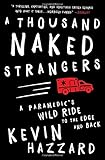 Kevin Hazzard re-started his career as an EMS, wanting to help strangers at possibly the worst time in their life. He starts with training and, once he passes, tries to find a job. Unable to find work for a hospital, he works at private company and the tales begin. Given that EMTs are stuck in a truck with another EMT/medic for an entire shift, this book is as much about the people Hazzard works with as the calls he goes on. The two taking all the calls need some level of trust and connection to make it bearable to get through the day.
Kevin Hazzard re-started his career as an EMS, wanting to help strangers at possibly the worst time in their life. He starts with training and, once he passes, tries to find a job. Unable to find work for a hospital, he works at private company and the tales begin. Given that EMTs are stuck in a truck with another EMT/medic for an entire shift, this book is as much about the people Hazzard works with as the calls he goes on. The two taking all the calls need some level of trust and connection to make it bearable to get through the day.
 Young Miranda lives on a farm with her large family and one day her parents get a letter from a cousin that asks them to send their eldest daughter to Dragonwyck. The letter comes from Nicholas Van Ryn, socialite from the Hudson Valley. Miranda is super excited to leave behind her simple life and become more sophisticated.
Young Miranda lives on a farm with her large family and one day her parents get a letter from a cousin that asks them to send their eldest daughter to Dragonwyck. The letter comes from Nicholas Van Ryn, socialite from the Hudson Valley. Miranda is super excited to leave behind her simple life and become more sophisticated.
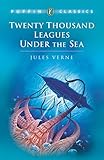 Professor Aronnax is invited on an expedition to find a giant sea creature responsible for eating a hole in a steel ship and almost sinking it. Having a passion for studying the sea, he gratefully accepts and brings his assistant along with him. On the ship, they meet Canadian harpooner Ned Land who will be responsible for taking the beast down. It takes a while, but they eventually find the monster and pursue it. When they get close enough they try a shot at the beast, it looks like it does no damage. The beast takes aim at the ship and Prof. Aronnax and his mate go overboard.
Professor Aronnax is invited on an expedition to find a giant sea creature responsible for eating a hole in a steel ship and almost sinking it. Having a passion for studying the sea, he gratefully accepts and brings his assistant along with him. On the ship, they meet Canadian harpooner Ned Land who will be responsible for taking the beast down. It takes a while, but they eventually find the monster and pursue it. When they get close enough they try a shot at the beast, it looks like it does no damage. The beast takes aim at the ship and Prof. Aronnax and his mate go overboard.
 Jessie gets a call from her aunt summoning her home to deal with a family emergency. Jessie grew up on an island off the coast of South Carolina with her mom, dad, and brother until a tragic boat explosion took her father when she was only 10. Since then, the family was never the same. Jessie escaped the island the first chance she got, got married to Hugh and had a daughter. But when she finds out that her mother has purposely cut off a finger, Jessie needs to return to the island and face the past.
Jessie gets a call from her aunt summoning her home to deal with a family emergency. Jessie grew up on an island off the coast of South Carolina with her mom, dad, and brother until a tragic boat explosion took her father when she was only 10. Since then, the family was never the same. Jessie escaped the island the first chance she got, got married to Hugh and had a daughter. But when she finds out that her mother has purposely cut off a finger, Jessie needs to return to the island and face the past.

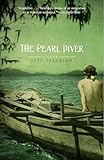 Miss Fuji is the youngest pearl diver in her group. She feels at peace in the water and comes back daily with bounty from the sea. On one dive, she cuts her arm but doesn't notice the pain. She sees a spot on her skin in the same area where she got cut. She doesn't think too much of it until she finds another spot and goes to the doctor. Miss Fuji has leprosy.
Miss Fuji is the youngest pearl diver in her group. She feels at peace in the water and comes back daily with bounty from the sea. On one dive, she cuts her arm but doesn't notice the pain. She sees a spot on her skin in the same area where she got cut. She doesn't think too much of it until she finds another spot and goes to the doctor. Miss Fuji has leprosy.
 Susan Fletcher is the head cryptographer at the NSA and has a romantic weekend planned with her fiance. He gets called away on an emergency and it's not long before Susan also receives a call from her boss. She needs to come in to work and not say anything.
Susan Fletcher is the head cryptographer at the NSA and has a romantic weekend planned with her fiance. He gets called away on an emergency and it's not long before Susan also receives a call from her boss. She needs to come in to work and not say anything.
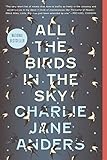 I struggle to find the words to describe this book for me. It centres around two characters: Patricia and Laurence. Patricia is a witch who can cast spells, heal people, fly, and talk with animals. Laurence is a tech geek who can build incredibly complex machines and AI. The two should have absolutely nothing in common but they find each other as outcasts in school. When Laurence learns of Patricia's skills, they drift apart but reconnect as adults. Meanwhile, the world around them is turning to shit and it could be on them to fix it.
I struggle to find the words to describe this book for me. It centres around two characters: Patricia and Laurence. Patricia is a witch who can cast spells, heal people, fly, and talk with animals. Laurence is a tech geek who can build incredibly complex machines and AI. The two should have absolutely nothing in common but they find each other as outcasts in school. When Laurence learns of Patricia's skills, they drift apart but reconnect as adults. Meanwhile, the world around them is turning to shit and it could be on them to fix it.
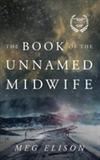 When the disease hit, the midwife was right in the thick of it working at the hospital as it took out almost all females and children. No babies survived childbirth and hardly any of the mothers. Men were contracting the disease as well, but the mortality rate wasn't as high as the females. When she falls sick she thinks this is the end for her as well.
When the disease hit, the midwife was right in the thick of it working at the hospital as it took out almost all females and children. No babies survived childbirth and hardly any of the mothers. Men were contracting the disease as well, but the mortality rate wasn't as high as the females. When she falls sick she thinks this is the end for her as well.
 Libby Day was the victim of a horrific crime when she was a child. Her brother killed her mom and two sisters but Libby managed to escape and run away, only to finger him to the police later. Now in her 30s, she has run out of the money the community pooled together for her and needs to find a new way to sustain herself. She is offered money to appear at a nearby club that is interested in true crime and despite no interest in doing this, the money wins out. Attending this event, she finds that everyone thinks her brother innocent and Libby's testimony spoon fed to her by the police. Libby starts to question that night.
Libby Day was the victim of a horrific crime when she was a child. Her brother killed her mom and two sisters but Libby managed to escape and run away, only to finger him to the police later. Now in her 30s, she has run out of the money the community pooled together for her and needs to find a new way to sustain herself. She is offered money to appear at a nearby club that is interested in true crime and despite no interest in doing this, the money wins out. Attending this event, she finds that everyone thinks her brother innocent and Libby's testimony spoon fed to her by the police. Libby starts to question that night.
 Dr. Tony Hill is bedridden after an attack at a mental ward and an axe to the knee. It's really not a good time to be immobile when a top footballer is admitted to the hospital and the staff finds out that he has been poisoned with ricin. He passes away and Detective Chief Inspector Carol Jordan is called in to investigate. Researching from a hospital bed, Tony is frustrated at the lack of progress he makes, but eventually finds a possible connection to another mysterious poisoning case.
Dr. Tony Hill is bedridden after an attack at a mental ward and an axe to the knee. It's really not a good time to be immobile when a top footballer is admitted to the hospital and the staff finds out that he has been poisoned with ricin. He passes away and Detective Chief Inspector Carol Jordan is called in to investigate. Researching from a hospital bed, Tony is frustrated at the lack of progress he makes, but eventually finds a possible connection to another mysterious poisoning case.